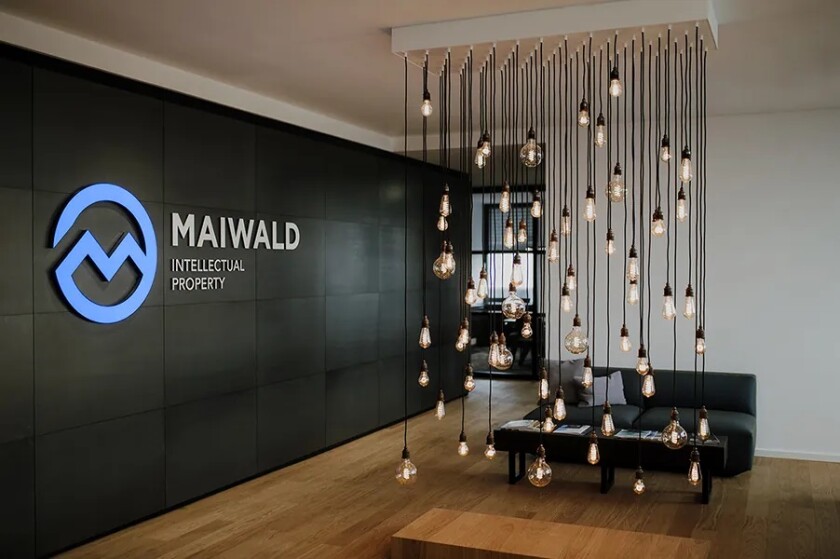Please tell us more about Maiwald
With over 270 people and offices in Munich and Düsseldorf, Maiwald supports clients in securing, defending, and enforcing intellectual property rights. Our team – comprising about 110 highly qualified patent attorneys, attorneys-at-law, and technical experts, including search specialists – devote their skills and extensive experience to provide clients with customised IP solutions. Our expertise covers all aspects of intellectual property law, across all industries and technical sectors.
How would you describe Maiwald’s strategy in the patent space, and how has this changed over the past few years?
Maiwald’s strategy in the patent space has been dynamic and forward-thinking, focusing on both organic and inorganic growth to strengthen our position as a leading firm in intellectual property law.
Over the past years, we’ve pursued a multifaceted approach to growth.
Firstly, we’ve achieved inorganic growth by integrating smaller IP boutiques into our firm. This has allowed us to expand our business and enrich our team with diverse expertise. We are also open to lateral hires, welcoming experienced partners and attorneys from other IP firms who bring valuable insights and skills to our practice.
At the same time, we remain committed to nurturing talent from within. We provide opportunities for those we have trained from scratch to develop and advance their careers within Maiwald.
This balance between external expansion and internal development has been crucial to our success.
Our growth strategy spans, of course, all technical sectors, but due to our special expertise in the field of artificial intelligence, our “engineering” team – including mechanical and electrical engineering, physics, and computer science – has been outperforming the other teams recently. This field is of increasing importance, especially with the rise of technologies like artificial intelligence. Our engineering team has yielded impressive results, with growth rates in the engineering field reaching nearly 20%.
Overall, our strategic initiatives have resulted in substantial growth across the firm, reinforcing our ability to deliver exceptional service to our clients, not only in EPO opposition proceedings, for which we were honored with the MIP award this year, but beyond that. We are proud of our achievements and remain dedicated to adapting our strategies to meet the evolving needs of the patent landscape.
Looking ahead, Maiwald is committed to continuing our growth strategy while placing even greater emphasis on streamlining our internal processes. This approach ensures that we maintain the high quality of service our clients expect, leveraging state-of-the-art tools and technologies.
To achieve this, we rely on our dedicated internal team of software engineers, who are instrumental in creating a modern and digital work environment. Their expertise allows us to integrate advanced technological solutions into our daily operations, enhancing efficiency and productivity across the firm.
By focusing on both growth and process optimisation, we aim to stay at the forefront of the patent space, delivering exceptional service to our international client base in all areas of intellectual property law.
What distinguishes Maiwald from other companies?
One of Maiwald’s key strengths lies in our ability to handle complex cases that require expertise across multiple technical fields. As the landscape of intellectual property becomes increasingly intricate, an increasing number of cases demand a multidisciplinary approach.
Our team is uniquely equipped to meet these challenges, thanks to our diverse range of patent attorneys and attorneys-at-law who possess deep knowledge in various technical areas and different court proceedings. This allows us to seamlessly integrate different perspectives and expertise, ensuring comprehensive and effective solutions for our clients.
By fostering collaboration among our team members, Maiwald excels in navigating cases that span multiple domains, providing our clients with the confidence that their matters are being handled with the utmost precision and care.
Another distinguishing feature of Maiwald is our ability to handle litigation proceedings seamlessly, thanks to our team of in-house attorneys-at-law. This capability allows us to manage cases before both German courts and the Unified Patent Court (UPC) from a single, integrated source.
Having ‘in-house’ legal expertise means that we can offer our clients a cohesive strategy that encompasses both the technical and legal aspects of their cases. This integration ensures that our clients receive consistent and comprehensive representation, reducing the complexity and costs.
Maiwald further distinguishes itself from other companies through its commitment to diversity and excellence in the field of intellectual property law. Our firm is proud to have a workforce where 44% of our employees and 45% of our partners are female, showcasing our dedication to gender equality and empowerment within the industry.
Moreover, our team is composed of individuals from 26 different countries, reflecting a highly diverse environment that enriches our firm with a wide range of perspectives and cultural insights. This diversity is a cornerstone of our ability to understand and meet the varied needs of our global clientele.
In addition to our diverse workforce, Maiwald boasts a very strong bench of patent attorneys and attorneys-at-law who possess expertise across almost every technical field. This breadth of knowledge enables us to provide comprehensive and specialised services tailored to the unique challenges of each case.
Our combination of diversity, expertise, and commitment to quality service sets Maiwald apart, allowing us to deliver innovative solutions and exceptional results for our clients.
Looking back, how would you describe the firm’s growth over the past years?
As Maiwald celebrates its 30th anniversary this year, we reflect on the continuous growth and evolution that has characterised our journey. Over the past three decades, we have pursued a strategic approach to growth, combining controlled inorganic expansion with a strong commitment to nurturing young talent.
As mentioned above, our inorganic growth strategy has involved integrating smaller IP boutiques into our firm, allowing us to expand our capabilities and expertise while maintaining a controlled and sustainable growth trajectory. At the same time, we have focused on supporting younger talents by providing them with opportunities to work visibly on important cases and facilitating their professional development through extended stays with foreign associates in countries such as the United States and Japan.
This dual approach has enabled us to cultivate a robust team of skilled professionals who are well equipped to handle complex international patent matters. Additionally, we strive to increase our local and international client base through attending and actively participating in international conferences, regular client seminars, and conducting international symposia for patent practitioners in collaboration with renowned international patent firms.
These initiatives not only enhance our visibility and reputation in the global patent community but also ensure that we remain at the forefront of intellectual property law, delivering exceptional service and innovative solutions to our clients worldwide.
What are the biggest challenges that international clients face when trying to build up their patent portfolios as well as enforce their patents later on in global patent litigation campaigns?
One of the biggest challenges, in our opinion, remains that different legal systems and different standards or thresholds are applied in different jurisdictions. While some aspects of patent law appear to follow a more harmonised approach (such as the novelty assessment), there are further criteria which might be handled differently in the various jurisdictions around the globe. For some cases it may be difficult for applicants to deal with these different standards in a consistent approach. This, of course, imposes difficulties and hurdles not only for portfolio building strategies but also for later enforcement, calling for a carefully tailored strategy.
In Europe, with the introduction of the UPC, a new court is operating that provides an additional forum for patent litigation, making up for at least part of the deficits across Europe’s diverse patent landscape, avoiding diverging decisions across major EU markets.
Each strategy should therefore factor in not only enforcing a patent in national litigation, but using the newly established UPC system, which has proven to be a fast and reliable system in its first two years. Also for nullity proceedings, the UPC opens new options for attacking the validity of the competitor’s patents. While, for example, a parallel nullity suit in Germany during ongoing EPO opposition proceedings is not possible, such parallel proceedings can be run at the UPC. An agile IP team with strong technical and legal expertise is thus of high importance, which we can provide to our clients.
How does Maiwald attract young talents and support their career advancement?
We at Maiwald try to make young people, such as patent attorney trainees, feel taken seriously, even when they are still junior. As part of the team, we try to involve our young talents from the very beginning in client meetings and videoconferences to get them to know the clients and their needs. We are trying to give our juniors a continuous opportunity to look over their ‘mentor’s shoulder’. They get the opportunity to participate in interaction with clients and are encouraged to present their work.
We also support our trainees on their way to become German and/or European patent attorneys by providing financial support for, e.g., exams and study materials. Maiwald also tries to give some younger attorneys the opportunity to spend some time abroad, such as in the US or Japan. This is a great chance for them not only to expand their knowledge on national practice in other countries and to start building their own network but also to develop on a personal level. What is also special about Maiwald is that even at an early stage of their career, we give our team members opportunities to attend conferences or to actively participate in client seminars, supporting them to grow their professional network and expand their skills.
What is the impact of the EPO’s ‘vico’ hearing format and the more streamlined proceedings?
The introduction of videoconference oral proceedings before the EPO has brought both advantages and challenges. On the positive side, videoconference hearings significantly reduce travel times, which not only saves time and travel costs but also minimises environmental impact. Additionally, the use of videoconferencing helps alleviate scheduling issues related to the availability of suitable physical hearing rooms, allowing for greater flexibility in arranging oral proceedings by the EPO.
However, there are also notable disadvantages associated with videoconference hearings.
From our experience, these oral hearings tend to be longer than in-person hearings. For cases involving multiple opponents, the standard duration has often been extended to two days instead of the former one day, and in some instances, hearings can last up to six or even eight days – a length almost unheard of before the adoption of videoconferencing.
Another concern is the logistical aspect of videoconference hearings, where members of the panel, such as the opposition division, are frequently not in the same location. This separation can hinder effective in-person deliberation, which may be a crucial component of thorough and cohesive decision-making.
Furthermore, data analysis following the introduction of videoconference hearings suggests a slight shift in outcomes, with decisions appearing to be more patentee-friendly (at least in the first instance). This observation raises questions about whether the format of the hearing might influence the decision-making process.
We advocate for a more flexible approach to oral hearings in the first instance, allowing for in-person hearings upon request by the parties, rather than defaulting to mandatory videoconference hearings. The EPO’s Enlarged Board of Appeal has recognised in its decision G 1/21 that in-person hearings represent the ‘gold standard’. We see no reason why this standard should differ for first-instance proceedings.
Ultimately, while videoconference hearings offer certain logistical benefits, maintaining the option for in-person hearings is essential to ensure fairness and uphold the integrity of the proceedings.
Regarding the EPO’s effort for more streamlined proceedings, a new scheme for acceleration of EPO opposition proceedings and the detailed guidelines have been introduced, in February 2024. These acceleration measures apply to new and pending proceedings. However, their effectiveness depends on when the EPO is notified of, e.g., parallel UPC infringement or revocation proceedings; the earlier this is done, the more effective the measures are. The UPC, on the other hand, may stay proceedings in view of pending EPO opposition/appeal proceedings if a rapid decision may be expected from the EPO. So far, however, the UPC has shown little willingness to suspend its fast-track proceedings. It is then probably more up to the EPO to speed up the opposition and appeal proceedings as effectively as possible to ensure that a uniform assessment of the validity of a European patent is made as far as possible. As things stand, the validity of a newly granted European patent or one that is only at the beginning of the opposition proceedings will most likely be assessed by the UPC first.
AI has continued to be a defining topic in the area of patents over the past five years. What impact do you feel it will have on your practice?
AI will continue to reshape both substantive IP law as well as processes within the IP practice.
Regarding substantive IP law, a global IP strategy requires an in-depth understanding of jurisdictional differences, taking into account the fast pace of the technological development in this field as part of the drafting strategy, staying on top of case law and technological developments, and expanding technical expertise to allow for excellent service where AI solutions overlap with almost all technical fields, including those deeply rooted in the life sciences.
We invest in the thorough evaluation and integration of AI-based tools to support our internal workflows, enhance even further our efficiency, and maintain competitiveness, while ensuring full compliance with data protection and confidentiality standards. By developing our own secure solutions and offering targeted training, we empower our professionals to use AI effectively and responsibly in daily practice.
















